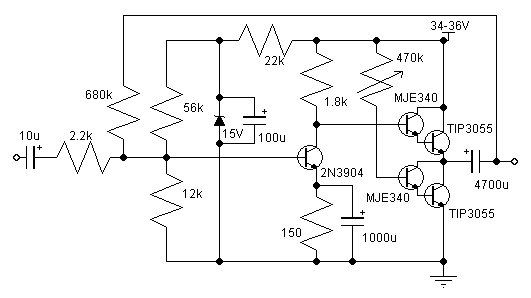This class A amplifier circuit requires a preamp as it hasn't got much gain. Requires large heat sinks and a large transformer and a source of great power and wiring carefully, but the end is very simple and sounds great. The zener diode disclaims any wave from the power supply, but still just want a wave of 10mV max. The ripples reaching the entrance is amplified, so the zener get rid of that, but there is still dominated him to reach the power stage.
Many early amplifiers operated in Class A, but as 10W power output rose above the problems of heat dissipation and design of the power supply caused most manufacturers to turn to the simplest, arrangements more efficient class B and put up with the consequent decrease in the perceived quality of output. Why Class? Because, when biased in class A, the transistors are always on, always ready to respond instantly to an input signal. Class B and Class AB output stage requires a microsecond or more on. The kind of a cleaner operation allows operation under high voltage swing that occurs when the transient audio signal feed difficult loads. Your amplifier is basically simple, as shown in the block diagram.










